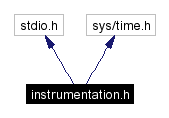
Instrumenting blocks of code or expressions is done by adding a call to CB_INSTR_POINT in the configure.in file and surrounding the code with a macro call. For example, to do high resolution timings of the following code:
for( lpc = 0; lpc < 100; lpc++ )
{
...
}
You would modify the configure.in to include:
CB_INSTR_POINT([my_point],
[HRTIME_INSTR],
[My instrumentation point])
Where 'my_point' is the name of the instrumentation point, HRTIME_INSTR is the C macro that will record the timings, and 'My instrumentation point' is the description of the point. The result of this call will be two new definitions in the config.h: 'INSTR_my_point' and 'INSTR_my_point_data'. The first C macro is used to surround the code block and the second contains the data used to initialize the instrumentation point structure (iPoint). With these new definitions, we can modify our original code to add instrumentation:
#if defined(INSTR_my_point_data) static struct iPoint IP_my_point = { INSTR_my_point_data }; #endif ... INSTR_my_point(&IP_my_point, ({ for( lpc = 0; lpc < 100; lpc++ ) { ... } }));
(Notice the parentheses around the code block, these are required for things to parse correctly.)
Finally, to enable this instrumentation point, you either need to use --enable-instrumentation to enable all of the points, or --enable-instrumentation=my_point to enable only this point.
Definition in file instrumentation.h.
Include dependency graph for instrumentation.h:

This graph shows which files directly or indirectly include this file:

Go to the source code of this file.
Classes | |
| struct | iInstrumentationData |
| struct | iPoint |
Defines | |
| #define | IPOINT_INIT_HISTORY(history) |
| Macro used to statically initialize the ip_History field of the iPoint structure. | |
| #define | HRTIME_INSTR(point, block) |
| Macro used to perform high-resolution timings of a block of code. | |
| #define | LRTIME_INSTR(point, block) |
| Macro used to perform low-resolution timings of a block of code. | |
| #define | ACCUM_INSTR(point, expr) |
| Macro used to record the value of an numeral expression. | |
| #define | NOINSTR(point, block) block |
| Macro used to avoid instrumenting a block of code. | |
Typedefs | |
| typedef unsigned long long | lrtime_t |
| Container for low-resolution timer values. | |
| typedef unsigned long long | hrtime_t |
| Container for high-resolution timer values. | |
Enumerations | |
| enum | { IPB_DROP_HISTORY_START } |
| enum | { IPF_DROP_HISTORY_START } |
Functions | |
| lrtime_t | lrtime (void) |
| hrtime_t | hrtime (void) |
| void | iPostFloatData (struct iPoint *ip, double value) |
| Post a floating point data value to an instrumentation point. | |
| void | iPrintPoint (FILE *file, struct iPoint *ip) |
| Print the collected values for an instrumentation point. | |
| void | iPrintPoints (FILE *file) |
| Print all of the instrumentation points that have had data posted to them. | |
| void | iPrintPointsAtExit (void) |
| An atexit(3) function that calls iPrintPoints with a file whose name is taken from instrumentation_data.iid_OutputFileName or derived from the package name and process ID. | |
Variables | |
| iInstrumentationData | instrumentation_data |
| The global data needed by the instrumentation infrastructure. | |
|
|
Value: { \
iPostFloatData(point, (double)(expr)); \
}
Definition at line 242 of file instrumentation.h. |
|
|
Value: { \
hrtime_t _start, _end; \
\
_start = hrtime(); \
block; \
_end = hrtime(); \
iPostFloatData(point, (_end - _start)); \
}
Definition at line 208 of file instrumentation.h. |
|
|
Value: { \
history, \
sizeof(history) / sizeof(double) \
}
Definition at line 195 of file instrumentation.h. |
|
|
Value: { \
lrtime_t _start, _end; \
\
_start = lrtime(); \
block; \
_end = lrtime(); \
iPostFloatData(point, (_end - _start)); \
}
Definition at line 225 of file instrumentation.h. |
|
|
Macro used to avoid instrumenting a block of code.
Definition at line 255 of file instrumentation.h. |
|
|
Definition at line 122 of file instrumentation.h. References hrtime_t. |
|
||||||||||||
|
Post a floating point data value to an instrumentation point.
Definition at line 71 of file instrumentation.c. References IP_HISTORY_START_ADD, and require. |
|
||||||||||||
|
Print the collected values for an instrumentation point.
Definition at line 108 of file instrumentation.c. References IP_HISTORY_START_ADD, and require. Referenced by iPrintPoints(). |
|
|
Print all of the instrumentation points that have had data posted to them.
Definition at line 155 of file instrumentation.c. References instrumentation_data, iPrintPoint(), and require. Referenced by iPrintPointsAtExit(). |
Here is the call graph for this function:

|
|
Definition at line 91 of file instrumentation.h. References lrtime_t. |
 1.3.4
1.3.4